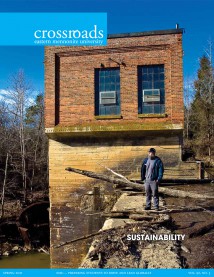
Dave Hockman-Wert monitors ecosystems and species, specializing in fish.
Working for the federal government was not necessarily the dream job of Dave Hockman-Wert ’91 after graduate school, but, nine years ago, his roots sank into the Forest and Rangeland Ecosystem Science Center (FRESC) of Corvallis, and he has remained ever since.
FRESC is part of the Biological Resources division of the federal science agency known as the U.S. Geological Survey (USGS). FRESC focuses specifically on vegetation, wildlife and fish research in the western portion of the nation, with special attention to threatened and endangered species. The organization is one of twenty USGS science centers nationwide.
Though his job title is “biologist,” Hockman-Wert’s daily endeavors include working on the geographic information systems (GIS), spatial analysis and data management for the aquatic ecology group.
Hockman-Wert and team members place tags in cutthroat trout in order to track population, distribution and growth over time. This study will help FRESC understand the impacts of industrial forestry on fish in headwater streams.
Another study involving fish is zooming in on the fish community in the Elwha River where two large dams have blocked access to miles of stream for several years. Plans are in place to remove the dams within the next two years. Hockman-Wert will track the changes that occur in brook trout and bull trout as this process takes place.
“We see a wide range of behaviors in the fish we study, and we do start to wonder whether fish are as hard to generalize about as humans are,” says Hockman-Wert.
“Science centers support land management agencies with good, up-to-date information (hopefully) and improved methods of monitoring ecosystems and species,” he says. “These agencies have the official responsibility to conserve, use, and protect federally-owned land for the good of the whole. Given the number of people in the world and the amount of resources we require for sustenance, the more we know about how to fill our needs with the least amount of impact on the rest of the world, the better.”
– By Heidi Martin for the Mennonite Creation Care Council. Posted 11/30/2009. Reprinted, abridged and slightly updated with Heidi’s permission from blog.goshen.edu/creationcare/tag/creation-care-council
